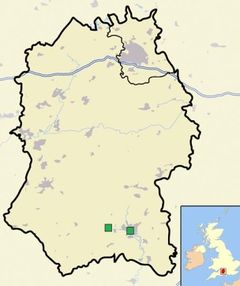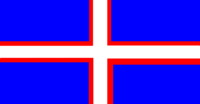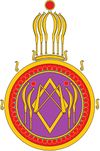Kingdom of Wilcsland
Kingdom of Wilcsland | |
|---|---|
| Motto: Look for the Light | |
| Anthem: Protectors of the Earth | |
 Wilton and Salisbury, Wiltshire | |
| Capital and largest city | Wilton |
| Official languages | English |
| Demonym(s) | Wilcslandian |
| Government | Absolute monarchy |
• Kings | Ptolemy I (2010-2014) Ptolemy II (2014-2019) John II (2015-2019) |
| Establishment | Chiefdom of the Plains 1995 Kingdom of South Bank 1 May 2002 Outpost of Corran 2005 Kingdom of Moylurg 11 June 2009 Kingdom of Wilcsland 10 November 2010 |
| Population | |
• Census | ~35 (c. 2010) |
| Time zone | UTC |
The Kingdom of Wilcsland was a micronation located in Wiltshire, Great Britain. Ruled under an absolute monarchy, it was founded by King Declan I, who used the regnal name Ptolemy I Helios within Wilcsland from February 2011. Although itself established on 10 November 2010, Wilcsland was the last in a line of successor states to the Kingdom of South Bank, founded in May 2002. Wilcsland entered into the United Kingdom of New Wessex in January 2012 (which effectively collapsed over the latter half of 2013), and after the departure of Ptolemy I from his lands in 2014 his brother Ptolemy II took the throne. However, his attempt to revive the nation was unsuccessful, and after several years of nominal existence Wilcsland was formally dissolved on 31 December 2019.
Government
The Kingdom of Wilcsland was an absolute monarchy. It was ruled by King Declan I - who assumed the regnal name of Ptolemy I Helios on 15 February 2011 - until his brother Ptolemy II seized the throne on 31 December 2014. The King held sole and absolute executive, administrative, legislative and judicial power and authority.
Ptolemy I appointed and dismissed several "King/Queen-Regents" throughout his reign, all of whom in theory held equal power to him while being titularly subservient to him and able to be deposed by him at will; in practice, however, these co-rulers rarely held anything more than a purely ceremonial position. The title of King/Queen-Regent originated in Moylurg (the immediate predecessor state of Wilcsland), as a misspelling of "Queen-Regnant" (i.e., one ruling in her own right) which quickly became established as the official spelling.
A list of Kings/Queens-Regent is as follows:
- 17 November 2010 - 15 February 2011: HM Queen Frances I (briefly renamed Arsinoe I Selene on the last day of her reign)
- 15 February 2011 - 16 February 2011: HM King Ptolemy II Alexander II
- 16 February 2011: HM Queen Berenice I
- 16 February 2011 - 21 February 2011: HM Queen Arsinoe II Cleopatra I
- 21 February 2011 - 12 March 2011: HM King Ptolemy III Helios II
- 27 August 2011 - 31 August 2011: HM Queen Arsinoe III
The ruling house of Wilcsland was the House of Mac Donnchadha-Houghton, a large family with Irish ancestors. Ptolemy I commonly stressed the apparent popularity of the monarchy to outside observers, claiming that no desire had ever been expressed to modify Wilcsland's government in any way.
History
Pre-Wilcslandian history
The Kingdom of Wilcsland was founded on 10 November 2010 as a reformed version of the Kingdom of Moylurg. Moylurg was a union between three nations: the original (pre-March 2010) Moylurg, the Kingdom of the Taklamacan, and the Kingdom of Corran.
The history of Wilcsland is found in the histories of these three nations.
Taklamacan
The furthest back that Wilcsland can trace its history is to a group of small tribes or "chiefdoms" located within Wilton First School, ruled over by "Chieftens" [sic] in the last few years of the twentieth century. The earliest known of these, from which Wilcsland claims its ultimate heritage, was known as the Chiefdom of the Plains. This chiefdom unified, or at least was the dominant power over, the other chiefdoms at the time, although this hegemony is only known to have lasted through 1995 before the Chiefdom of the Plains dissolved and the other chiefdoms became independent again.
In 1999, the Chiefdom of the Sun, led by Chieften Nectombetec II, conquered the other local chiefdoms (most notably the Chiefdom of the Moon and the Eastern Chiefdom). On 1 May 2002, these conquered chiefdoms were unified into the Kingdom of South Bank. Nectombetec II was proclaimed King Declan I (the origin of the monarchy of Wilcsland) and given a simple flail as a symbol of royal power. The Kingdom was very weak at the start, and one former Chieften, Olcut III of the Chiefdom of the Moon, proclaimed himself King of half of the kingdom in June 2002 as Barry I of South Bank.
A brief civil war began that ended with Barry I being defeated and Declan I ruling all of South Bank once more. With a much stronger hold on power, the King expanded South Bank and established outposts, which helped the Kingdom survive until it was forced to move in September 2003, when Declan I and most of the citizens of South Bank moved to the Forgotten Realms (i.e., Wilton Middle School). The former citizens of South Bank founded a new state, the Kingdom of Atlantis, around a new capital named Atlantos which the King had ordered created. He founded a vassal kingdom called the Kingdom of Saqqara, ruled by King John I.
Another kingdom called the Kingdom of Thebes existed nearby under another ruler, King Kieran I. Thebes attacked Saqqara and Atlantis, prompting Declan to take Thebes by force. At the same time, Declan I took the throne of the vassal kingdom, becoming King of Atlantis, Saqqara and Thebes. These three kingdoms created a writing system, now long dead and lost to history.
In 2005, Declan I realised that his people would have to move again due to his year group having come to the end of Key Stage 2. He and most of his people left the Forgotten Realms with a shipment of materials from those lands, and in October of that year founded the Kingdom of the Taklamacan at Westwood St Thomas School. This new kingdom immediately and consistently had problems with a nearby people, termed barbarians by the Taklamacanians. Constant attacks - becoming more and more violent, injuring some Taklamacanians - forced the Taklamacan to evolve quickly. With Saqqara and Thebes now without their own territory, they became subkingdoms of the Taklamacan, with their citizens retaining a subnational identity but falling under the political jurisdiction of the Taklamacan.
These attacks did not however stop the kingdom from developing its art, which was based on the art from the kingdoms that came before. When a war-like neighbouring kingdom offered some troops, it asked for some art in return. The kingdom became a melting pot of new ideas and creation, not just a war zone.
Before long however, the kingdom entered a unstable period. Art and creation went into decline and stopped after a new King took over half of the kingdom, declaring himself Alexander I of the Taklamacan. Declan I defeated Alexander I, but soon afterwards another new King, Joshua I, bribed his way to the throne and managed to depose Declan I. Soon after he became King, the kingdom began to collapse and the outposts gained independence. Declan I returned to power after only a week, but by then the incompetent rule of Joshua I had resulted in large areas of land being conquered by the barbarians and the outposts, major sources of materials, declaring independence; the artistic, creative kingdom was dead, and what was left was very weak. Yet another civil war broke out when another usurper king, Joshua II, took over half of the kingdom; he soon abdicated and the war ended, but the damage done was now irreparable, and the Taklamacan fell into a dark age.
In late 2007, Declan I held a coronation as King of the Taklamacan, and immediately began a renewed attempt at restoring the former greatness of the kingdom. Outposts and military bases were established, the full authority of the monarch was restored, and the Taklamacan began to thrive again.
After a few years, in June 2009, the Kingdom of Moylurg was created by Declan I, and the Taklamacan became a Moylurgian Commonwealth Realm along with the Kingdom of Corran. On 7 March 2010, Declan I united the Taklamacan with Moylurg and Corran into the Empire of Moylurg, which became the Kingdom of Wilcsland.
Corran
The Kingdom of Corran was one of the outposts originally founded by Declan I in 2005 to supply the Taklamacan with resources, but had declared independence during the reign of Joshua I or in the chaos that the kingdom suffered for about a year after his reign. Declan I sent a vassal monarch to retake Corran in late 2007, and the sending of resources began again, helping to build the resurgent Taklamacan. In October 2009, Declan I deposed the vassal monarch and became King of Corran.
Around this time, the Kingdom of the Taklamacan and the Kingdom of Corran became Moylurgian Commonwealth Realms; instead of ruling from Taklamacan, the direct successor state of South Bank, Declan I now ruled from his new realm of Moylurg. On 7 March 2010, Declan I united the Corran with the Taklamacan and with Moylurg, founding the Empire of Moylurg as a political union between his three main kingdoms and assuming the title Emperor of Moylurg and the regnal name of King Tanwetamani. Corran therefore became part of what would become the Kingdom of Wilcsland.
Moylurg
The Kingdom of Moylurg was founded on 11 June 2009 by King Declan I of the Taklamacan. Rather than being based at his school, as had all previous nations he had administered, this new nation claimed various properties and territories around his town of Wilton. Originally, Moylurg was also known as Deleckshum, and Declan I ruled as both Emperor of Deleckshum and King of Moylurg. The month after Moylurg's foundation, Declan appointed a co-ruler, Queen-Regent Frances I, who reigned from July to October 2009. Around the time her reign ended, Moylurg began to become known exclusively by that name, and Declan I abolished his title Emperor of Deleckshum.
Late in the year, during the New Kingdom of Moylurg's history, both the Taklamacan and Corran became Moylurgian Commonwealth Realms, establishing that Declan I regarded Moylurg as his foremost nation.
The so-called "Golden Period" of Moylurg's history started on 9 February 2010 with the declaration of Laura I to be the new Queen-Regent, ruling alongside Declan I. The Kingdom of Moylurg began to open diplomatic relations with over nations, some of them overseas; on 10 February, the two monarchs opened diplomatic relations with the Zonian Confederacy, and the day afterwards agreed to relations with the Kingdom of Angador. On 24 February, Moylurg entered its first formal written alliance, with the Federal Republic of St.Charlie.
On 7 March 2010, Declan I joined Moylurg, the Kingdom of the Taklamacan, and the Kingdom of Corran in political union, creating the Empire of Moylurg. The following month, the Empire was renamed back to a Kingdom, but this new, much larger Moylurg was now a direct successor state of the Taklamacan and therefore of the King's first nation, South Bank, which had been founded in May 2002.
The Golden Period is considered to have ended with the removal from power of Laura I on 1 May 2010, after she spoke to Declan I in a way that he considered to be unacceptable. After the Golden Period, Declan I began to focus more on foreign than on domestic affairs, and started to become inactive in governing Moylurg itself. Moylurg entered into an alliance with the Empire of Austenasia and diplomatic relations with the rest of the Carshalton Nations, but the population began to decrease, and King Declan's power with it. Declan I raised taxes to get materials for a new capital of Moylurg, and ordered a pottery kiln to be built to create new objects for the kingdom.
The population began to rise again but the nation was still not as stable or vibrant as it had been before. On 19 October 2010, Jonathan I was declared to be King alongside Declan I, although in practise the power of Jonathan I was merely titular. The end of the reign of Jonathan I marked the end of the Kingdom of Moylurg. Despite the best efforts of Declan I to restore the strength and creativity of Moylurg, an assembly of its population had decided that more thorough reforms were needed: Jonathan I was deposed by the people as a foreigner, and they declared the founding of the Kingdom of Wilcsland.
Kingdom of Wilcsland
The Kingdom of Wilcsland was founded on 10 November 2010 by an assembly of the people. King Declan I was re-affirmed as absolute monarch, but his co-ruler King Jonathan I was deposed, and compensated with the title Duke of Atlantos.
A week after Wilcsland was founded, Declan I appointed Frances I back to the throne as Queen-Regent. In December, the War of the Orlian Reunification broke out; despite not being directly involved, by its end, Wilcsland was suzerain over the Tsardom of Orly and the Midget Nation-in-Exile, and in personal union with the Empire of Austenasia.
In February 2011, there was a rather turbulent period during which five co-rulers reigned over the space of one week, after Declan I decided to model his kingdom more on Ptolemaic Egypt and have several monarchs with Ptolemaic regnal names. On 15 February, Declan I announced that the King of Wilcsland had the same rank as that of Pharaoh, giving himself the new regnal name in Wilcsland of King Ptolemy I Helios, and renaming that of Frances I to Arsinoe I Selene. Later that day, he deposed Queen Arsinoe, replacing her with his brother, to whom he gave the regnal name of Ptolemy II Alexander II. The day afterwards, Ptolemy II was deposed in favour of Berenice I, who later that very day was replaced with Arsinoe II Cleopatra I. She reigned for a bit longer - five days - until she too was replaced with Ptolemy III Helios II. King Ptolemy III reigned until 21 February, when he too was deposed.
The only co-ruler appointed after this flurry of appointments and depositions was Arsinoe III, mother of the King, who was named Queen-Regent for four days at the end of August 2011.
The rest of 2011 saw little of note taking place in Wilcsland, other than the granting of titles and the creation of various heraldry.
New Wessex and decline
On 14 January 2012, Ptolemy I Helios entered the Kingdom of Wilcsland into political union with the Tsardom of Orly, declaring the foundation of the United Kingdom of New Wessex. New Wessex existed as a union between Wilcsland and Orly until the latter was liberated from the King's rule in June 2013, after which Wilcsland continued to exist as the sole constituent country of New Wessex.
It must be noted that there is no record of any events of note whatsoever taking place in Wilcsland from the declaration of New Wessex in January 2012 (or, indeed, from a few months previously) until the end of the reign of Ptolemy I. Although Declan/Ptolemy had claimed a population of 35 citizens for Wilcsland as late as the end of 2012, it is doubtful that all of these retained contact with him.
On 6 May 2014, the Empire of Austenasia revoked recognition of New Wessex as a sovereign state on the basis of the lack of evidence of it having had any effective government for months. Wilcsland/New Wessex is thought to have for all intents and purposes completely collapsed as a political institution over the latter half of 2013 and the first few months of 2014, becoming no more than an identity for its citizens. By November 2014, Declan/Ptolemy had moved away from Wilton to London, cutting off contact with his former citizens.
Ptolemy II and collapse
On 31 December 2014, Declan's younger brother Prince Ciaran declared himself to be the new King of Wilcsland as King Ptolemy II, re-establishing royal authority and confirming the dissolution of New Wessex. He arranged for the now newly-independent Wilcsland to become a protected state of the Empire of Austenasia, but had otherwise inherited an impossible situation. The new king was unable to overcome the challenges faced by his kingdom, and what little remained of Wilcsland soon fell apart. The only major action taken by Ptolemy II was to appoint the now Brooklyn Hewitt his co-monarch as King John II on 30 April 2015. After nearly five years of titular reign by the two, Wilcsland was officially dissolved by John II on 31 December 2019, resulting in the end of the monarchy.
Culture
Wilcslandian culture was a direct continuation of the Moylurgian culture which existed between June 2009 and November 2010. A tolerant and artistic culture, it was based heavily on that of Ancient and (after the transition to Wilcsland) Ptolemaic Egypt, as well as its predecessor state of the Kingdom of the Taklamacan. National symbols of Wilcsland included the lion and the flail. Wilcsland wais also home to such monuments as the Wilcslandian Pyramids.
External links
 |
General
Administrative regions
Wilcsland • Orly • Saqqara • New Wiltshire Former states
Monarchs
Declan I, II & V • Nectombetec I • Djoser I/A • Olcut I/A • Temecbo • Telecbo • Olcut II the Great • Olcut III/C • Djoser II/B • Tupo • Barry I • John I • Kieran I & I • Alexander I (usurper) • Joshua I • Other notable people
Locations and monuments
|

